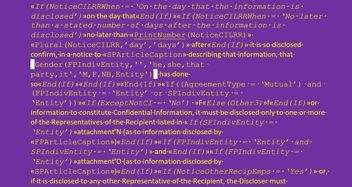
Yes, Adams Contracts templates are revolutionary. (See this blog post for more about that.) One constituency that's generally averse to revolution of any sort is the legal profession. Here are some reasons that might be trotted out to justify not using Adams Contracts templates.
Our Organization's Templates Are "Gold-Standard"
Your templates are so good that you have no need for Adams Contracts templates? As I say in this blog post, "I suggest that gold-standard precedents are as rare as albino alligators. Just as most of us haven't seen an albino alligator, I suspect that most of us haven't seen anything that could objectively called a gold-standard precedent."
Our Organization's Templates Are Good Enough
Because your organization's templates are good enough, you don't want to use Adams Contracts templates? How do you know they're good enough? Instead of being contract-drafting specialists, most of us draft by copy-and-pasting from precedent contracts or templates of questionable quality and relevance, and we rationalize doing so by invoking addled conventional wisdom. What you call "good enough," I would likely call the usual dysfunction of mainstream contract drafting.
Besides, aiming for "good enough" is aiming low. This is your template we're talking about! For selling zillions of widgets in thousands of transactions! Surely economies of scale would allow you to invest a little in doing it right. Generally, "good enough" doesn't reflect a shortfall in resources. Instead, it reflects a shortfall in competence and imagination.
For more on "good enough" in contract drafting, see this 2023 blog post and the two earlier blog posts on the subject it links to.
Traditional Language Has Been "Tested"
You're willing to rely on your templates because the traditional contract language they use has been "tested" by the courts? That's some old-school rationalizing. Here's what I said about that way back in 2006, in this blog post: "If contract language came to be tested, it’s because it failed to clearly state the intent of the parties. Why rely on language that resulted in litigation? Instead, express any given concept clearly, so you don’t have to gamble on case law breathing into it the desired meaning."
For more about the notion of "tested" contract language, see this 2023 blog post and the four other blog posts it links to.
We Have the Secret Sauce, and Adams Contracts Doesn't
I recall how years ago, someone from the law firm world explained to me that partners insist on using their own templates because partners think their templates contain "the secret sauce." My interlocutor went on to note, wistfully, that there's no secret sauce—thanks to EDGAR and other public repositories of contracts, and thanks to promiscuous copy-and-pasting, everything is out there. The odds are that Adams Contracts will have considered your secret sauce for a given template and either incorporated it as an option or chosen to omit it.
We Can Fix Our Own Templates
You can fix your own templates? You can't count on being able to do that, because creating, and even revising, contract templates is hard work. See this 2024 blog post.
Adams Is a Radical
I suspect that some find me too contrarian, but I'm actually pretty establishment. Delaware Courts cite me; see for example this 2020 blog post. The U.S. Supreme Court has cited me; see this 2024 blog post. The Law Society Gazette says in this review that A Manual of Style for Contract Drafting is "extraordinary." A BigLaw firm hired me to train 200+ associates. You get the idea.
There Are Too Many Questions
Yes, I've heard it many times—my highly customizable templates have too many questions! As I note in this blog post, I'm sympathetic to that cry for help when it comes from volunteers who decide they didn't sign up to spend that much time doing me a favor by taking a template for a test drive. But I have no sympathy if the person griping is someone creating a contract to use in a transaction that matters or to serve as the basis for a new template. If you're running a deal, it's your job to decide what deal points would best reflect your interests. Outsource that job to the copy-and-paste machine isn't a great option.
And anyway, after you've gone through the interview once, you can use the saved answers and don't have to go through the entire interview again unless you choose to.
Change Is Scary
I suspect that for many, the problem isn't shortcomings in Adams Contracts templates. Instead, the boogeyman is change. Your contracts personnel have to learn new stuff! Customers for your widgets will moan about how you're trying to pull a fast one by changing your templates! Change isn't worth it!
The quickest antidote to thinking that change is inherently bad, and that you don't suffer enough contracts pain to justify change, is to switch your thinking from short-term to long-term. Here's what I say about that in this 2024 blog post:
[T]he consequences of bad contract drafting aren’t immediate, or they’re uncertain. It’s easy to ignore the drip-drip-drip of time and money being chronically wasted. It’s easy to dismiss the risk of getting involved in an expensive, disruptive, and potentially embarrassing dispute. And the benefits of fixing contract language aren’t easy to quantify.
Those costs and benefits matter only if you plan for the long term. If you’re focused on the short term, they’re easy to ignore.
Turning Contract Drafting Into a Commodity Reduces Our Workload
I suppose it's possible that some don't want to turn contract drafting into a commodity process because they rely in reinventing the wheel, copy-and-paste style, to create additional billable hours. Or to give the impression that they're usefully busy. But our contracts process is too important to serve as your sinecure.
***
Are there good reasons for not using Adams Contracts templates? I can think of three. First, you're able to objectively establish that whatever contract you're planning to use is up to the task. Second, you don't have enough at stake that you would benefit from using a highly customizable template; instead, you use one of the standard-form initiatives that's out there. And third, your contract really is good enough—you have nothing meaningful at stake, so you don't much care what contract you use.


